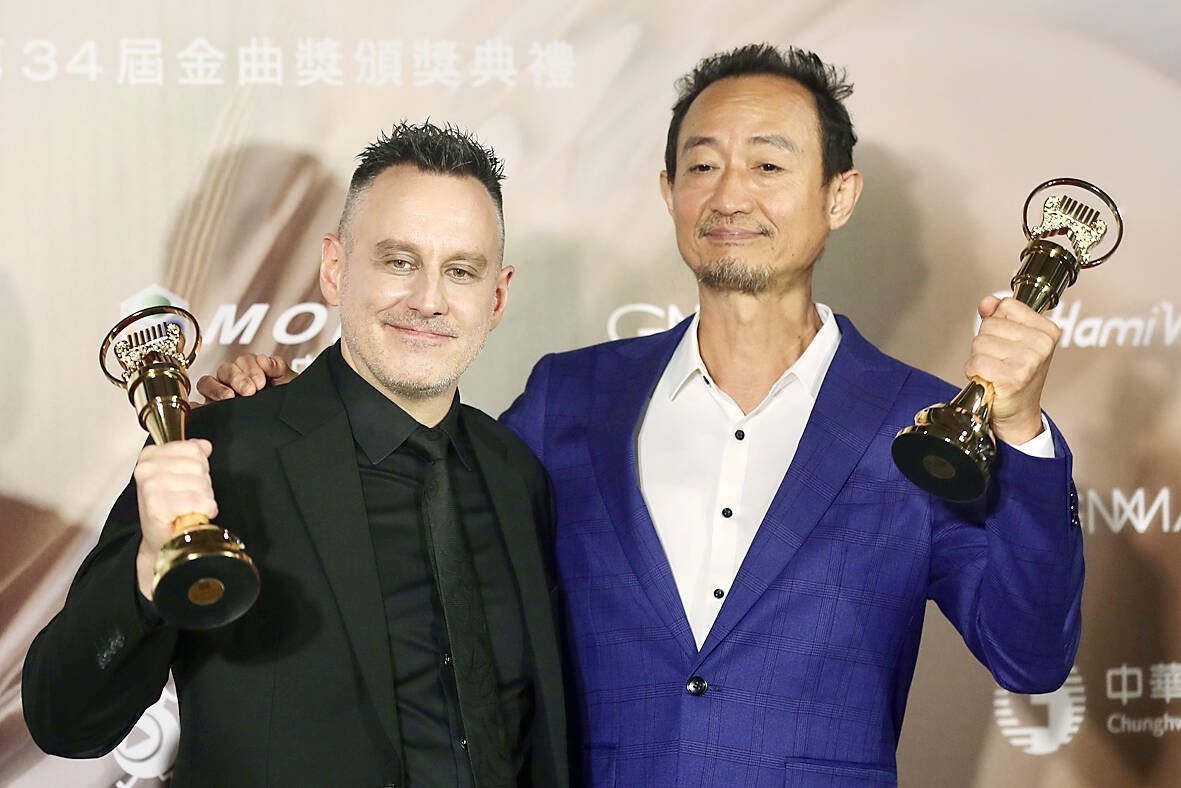The Golden Melody Awards, one of the most prestigious entertainment events in the Chinese-speaking world, late on Saturday celebrated the nation’s linguistic diversity with big wins for artists who primarily sing in Mandarin, but also recognition of those who sing in Hoklo (commonly known as Taiwanese), Hakka and indigenous languages.
Taiwanese singer A-lin (黃麗玲) prevailed against five other nominees to take home Best Mandarin Female Singer for her album LINK.
It was the 39-year-old A-lin’s first win in the category, after being nominated for the fifth time.

Photo: Sam Yeh, AFP
“I am sorry I might have to take up some of the audience’s time because I have rehearsed this walk for 16 years,” she said in her acceptance speech. “This is a written statement I have prepared all these years for the six times [including a nomination for Best New Artist] I’ve been nominated.”
“I thank myself for being able to sing as me because no matter if I was tall, short, chubby or skinny, I am me,” she said.
Taiwanese singer-songwriter Hush beat out five other nominees to take home Best Mandarin Male Singer for his album Pleasing Myself (娛樂自己).

Photo: EPA
Hush is the stage name of Taiwanese singer-songwriter and lyricist Chen Pin-he (陳品赫).
“We musicians are like chefs, in charge of mixing the sweet, the bitter, the sour and some spice — such as my hot self on the red carpet this evening,” he said in his acceptance speech.
Veteran star Julia Peng (彭佳慧) was named Best Singer in Hakka, despite never recording an album in the language before, while Enno Cheng (鄭宜農) won Best Female Singer in Hoklo and Best Hoklo Album, a language she does not speak.

Photo: EPA
Cheng, speaking in Mandarin in her acceptance speech, thanked the Hoklo language for “teaching me how to bow my head and slow down.”
In the indigenous language category, Paiwan singers Kasiwa and Matzka rapped and sang in their native tongue, with Kasiwa winning the prestigious jury award.
Rapper Kumachan (熊仔) won Best Mandarin Album for PRO, while singer-songwriter Wu Qing-feng (吳青峰), the front man for the band Sodagreen, took home Album of the Year for his third solo album, Mallarme’s Tuesdays (馬拉美的星期二).

Photo: AFP
Disco queen Ouyang Fei Fei (歐陽菲菲) and late lyricist and record producer Eric Lin (林秋離) were honored with the Special Contribution Award.
Ouyang, who was famous for having hair as big as her voice, broke through in Japan in the 1970s singing in Japanese.
“Singing and performing have always been my dream. If I can, I will continue to sing and never give up,” Ouyang, now 73, told the audience.

Photo: AFP
Lin’s posthumous Special Contribution Award was received by his widow and fellow musician Hsiung Mei-ling (熊美玲).
Lin’s life was dedicated to music, putting words to many songs such as Mandopop queen A-mei’s (張惠妹) hit ballad Listen to the Sea (聽海).
Most notably, while serving as the chairman of Ocean Butterflies Music in Singapore, Lin discovered Singaporean singing talents A-do (阿杜) and JJ Lin (林俊傑).

Photo: AFP
Eric Lin passed away on Dec. 11 last year at the age of 62.
JJ Lin, who viewed Eric Lin as a mentor, performed a tribute to the lyricist.
While Taiwan has only 23 million people, its music scene has an outsized influence in the Chinese-speaking world, in part due to creativity unhindered by censorship.

Photo: EPA
President Tsai Ing-wen (蔡英文) wrote on Facebook and Instagram that the love of music at the show had “eliminated language boundaries between different ethnic groups.”

AGING: As of last month, people aged 65 or older accounted for 20.06 percent of the total population and the number of couples who got married fell by 18,685 from 2024 Taiwan has surpassed South Korea as the country least willing to have children, with an annual crude birthrate of 4.62 per 1,000 people, Ministry of the Interior data showed yesterday. The nation was previously ranked the second-lowest country in terms of total fertility rate, or the average number of children a woman has in her lifetime. However, South Korea’s fertility rate began to recover from 2023, with total fertility rate rising from 0.72 and estimated to reach 0.82 to 0.85 by last year, and the crude birthrate projected at 6.7 per 1,000 people. Japan’s crude birthrate was projected to fall below six,

US President Donald Trump in an interview with the New York Times published on Thursday said that “it’s up to” Chinese President Xi Jinping (習近平) what China does on Taiwan, but that he would be “very unhappy” with a change in the “status quo.” “He [Xi] considers it to be a part of China, and that’s up to him what he’s going to be doing, but I’ve expressed to him that I would be very unhappy if he did that, and I don’t think he’ll do that. I hope he doesn’t do that,” Trump said. Trump made the comments in the context

SELF-DEFENSE: Tokyo has accelerated its spending goal and its defense minister said the nation needs to discuss whether it should develop nuclear-powered submarines China is ramping up objections to what it sees as Japan’s desire to acquire nuclear weapons, despite Tokyo’s longstanding renunciation of such arms, deepening another fissure in the two neighbors’ increasingly tense ties. In what appears to be a concerted effort, China’s foreign and defense ministries issued statements on Thursday condemning alleged remilitarism efforts by Tokyo. The remarks came as two of the country’s top think tanks jointly issued a 29-page report framing actions by “right-wing forces” in Japan as posing a “serious threat” to world peace. While that report did not define “right-wing forces,” the Chinese Ministry of Foreign Affairs was

PREPAREDNESS: Given the difficulty of importing ammunition during wartime, the Ministry of National Defense said it would prioritize ‘coproduction’ partnerships A newly formed unit of the Marine Corps tasked with land-based security operations has recently replaced its aging, domestically produced rifles with more advanced, US-made M4A1 rifles, a source said yesterday. The unnamed source familiar with the matter said the First Security Battalion of the Marine Corps’ Air Defense and Base Guard Group has replaced its older T65K2 rifles, which have been in service since the late 1980s, with the newly received M4A1s. The source did not say exactly when the upgrade took place or how many M4A1s were issued to the battalion. The confirmation came after Chinese-language media reported